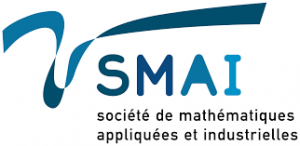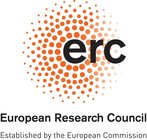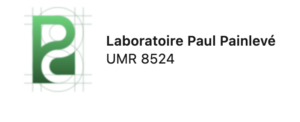CONFERENCE
SIGMA (Signal, Image, Geometry, Modeling, Approximation)
SIGMA (Signal, Image, Géométrie, Modélisation, Approximation)
28 October – 1st November, 2024
Scientific Committee
Comité scientifique
Bernhard Beckermann (Université de Lille)
Frédéric Chazal (Centre Inria de Saclay)
Tom Lyche (University of Oslo)
Carla Manni (University of Rome Tor Vergata)
Gabriele Steidl (Technical University of Berlin)
Organizing Committee
Comité d’organisation
Albert Cohen (Sorbonne Université)
Julie Digne (CNRS – Université Claude Bernard – Lyon 1)
Jalal Fadili (ENSICAEN)
Olga Mula Hernandez (Eindhoven University of Technology)
Anthony Nouy (Centrale Nantes)
The international workshop SIGMA’2024 is organized by SMAI-SIGMA, one of the five activity groups of the SMAI (Société de Mathématiques Appliquées et Industrielles). This activity group aims at developing new links between different mathematical communities by overcoming somewhat artificial frontiers, and thus to create within SMAI new activities and synergies around topics such as signal and image processing, approximation theory, computational geometry and geometric modelling. The main goal of this workshop is therefore to federate the communities of the above-mentioned subjects, to facilitate exchanges about joint knowledge and tools, and to initiate new interaction.
In order to reach these goals, the meeting is organized around 20 invited one hour talks in the different subjects of expertise of SIGMA. These talks will be accessible to a large audience, and given by international experts either in the central topics of SIGMA or in topics that may generate fruitfuil interactions. Furthermore, the meeting will also include 30 minutes contributed talks as well as poster sessions, which will in particular encourage young researchers to present their results, as well as free time left for informal discussions.
La rencontre internationale SIGMA’2024 est proposée par le groupe thématique SIGMA de la SMAI. Ce groupe a pour objectif de développer des liens forts entre diverses communautés scientifiques, au-delà de frontières parfois artificielles, et de créer ainsi, au sein de la SMAI, une synergie autour des thèmes signal et image, géométrie algorithmique, modélisation géométrique, approximation. Cette rencontre est donc conçue prioritairement pour aider à fédérer des actions de recherche autour des thématiques ci-dessus en permettant un partage efficace de connaissances/outils et l’interaction effective entre ces communautés.
Le partage de connaissances se fera grâce à 20 exposés invités de synthèse d’une heure environ, par des spécialistes internationaux de premier plan dans les hématiques du groupe SIGMA ou des thèmes extérieurs susceptibles d’interactions. La rencontre comportera aussi de des communications orales de 30 minutes et des posters, en particulier présentés par des jeunes chercheurs et doctorants, et des plages de temps laissées libres pour les discussions.
KEYNOTE TALKS
Matthieu Dolbeault (RWTH Aachen)
Virginie Ehrlacher (École des Ponts)
Philipp Petersen (University of Vienna)
Gabriel Peyré (ENS Ulm)
Audrey Repetti (Heriot-Watt University) Learning approaches for solving monotone inclusion problems in imaging
Justin Solomon (Massachusetts Institute of Technology)
Hendrik Speleers (University of Roma) Maximally smooth splines on triangulations
Claudia Totzeck (University of Wuppertal) Consensus-based optimization – a particle-based alternative for the robust calculation of eigenface
Mario Ullrich (Johannes Kepler University) Widths of convex sets and the power of adaption and randomization
Adrien Weihs (University of Manchester)
Invited and contributed talks
Laurent Baratchart (INRIA Sophia Antipolis)
Raphaël Barboni (ENS / Paris Sciences et Lettres)
Simon Boisserée (RWTH Aachen University) Analysis and numerics of nonlinear PDE systems in porous media flow models
Kristian Bredies (University of Graz)
Jonathan Chirinos Rodriguez (Université de Toulouse) Learning firmly nonexpansive operators
Matthew J. Colbrook (University of Cambridge) Computational barriers in data-driven dynamical systems
Julie Delon (Université Paris Cité)
Geneviève Dusson (Université Bourgogne France-Comté) Copula methods for modeling pair densities in electronic structure calculations
Salah Eddargani (University of Rome) Quadrature rules for splines of high smoothness on uniformly refined triangles
Jean Feydy (Inria Paris, HeKA team)
Jan Groselj (University of Ljubljana) Higher-degree super-smooth macro-elements in B-spline-like representations
Michael Hecht (CASUS / University Wroclaw)
Didier Henrion (Université de Toulouse) Solving moment and polynomial optimization problems on Sobolev spaces
Pierre Marion (EPFL) Three stories on deep linear networks
Gerlind Plonka (University of Goettingen, Germany)
Clarice Poon (University of Warwick) Sampling with overparameterized Langevin dynamics
Camille Pouchol (MAP5 / Université Paris-Cité) Random Leja points for interpolation
Nelly Pustelnik (ENS Lyon, France) Proximal multilevel algorithm
Lucia Romani (University of Bologna) A link between Chebyshev polynomials and level-dependent subdivision schemes
Maria Lucia Sampoli (University of Siena) Hierarchical matrices for 3D Helmholtz problems in multi-patch IgA-BEM setting
Josua Sassen (ENS Paris-Saclay) Riemannian Calculus on Latent Manifolds
Tomas Sauer (University of Passau) Prony, ideals and Gauss quadrature
Silvia Sellan (MIT) A new perspective on reconstruction from Signed Distance Functions
Espen Sande (EPFL)
Christoph von Tycowicz (Zuse Institute Berlin) Manifold GCN: Diffusion-based Convolutional Neural Network for Manifold-valued Graphs
Tino Ullrich (TU Chemnitz)
POSTERS
El Mehdi Achour(RWTH Aachen University) A general approximation lower bound in L_p norm, with applications to feed-forward neural networks
Clémentine Chazal (ENSAE)
Radu Dragomir (Télécom Paris) Implicit bias of mirror flow for classification on separable data
Olivier Gibaru (ENSAM, LISPEN)
Clément Guillot (Ecole des Ponts Paristech) Least square formulation for the time-dependent Schrödinger equation
Guillaume Houry (INRIA) Fast 1-Wasserstein Distance Approximations Using Greedy Strategies for Language Processing Applications
Varun Khurana (UC San Diego, Brown University) Neural Network Two-Sample Testing: Detecting Distribution Differences
Wael Mattar (Tel Aviv University)
Jiri Minarcik (independent researcher)
Differentiable Geometric Constraint Enforcement using Minkowski Penalties
Mimoun Mohamed (Aix Marseille Université) Straight-Through Meets Sparse Recovery: the Support Exploration Algorithm
Christophe Rabut (INSA Toulouse, France) « de Casteljau algorithm » and « Bézier curves »: When? Who? How?
Uaday Singh (IIT Roorkee) Some density results by deep Kantorovich type neural network operators
Viktor Stein (Technical University Berlin) Wasserstein Gradient Flows of Moreau Envelopes of f-Divergences in Reproducing Kernel Hilbert Spaces
Huqing Yang (RWTH Aachen University) Robust Sparse Low-Rank Approximation of Multi-Parametric PDEs
Qi Ye (South China Normal University) Composite Algorithms of Data-driven and Model-driven Methods in Banach Spaces
Gentian Zavalani (Helmholtz-Zentrum Dresden-Rossendorf)









